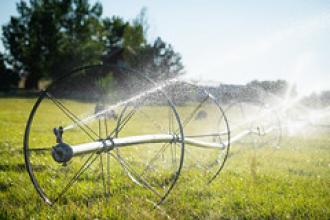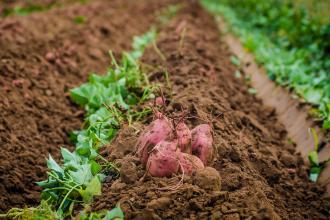
Water quality — the suitability of water to be used to irrigate and tend animals — is very important in agriculture.
On this page, find additional water quality information, including legal information, data and tools used for water quality assessment, and links to USDA research units containing relevant videos and scientific research related to water quality.
The U.S. Department of Agriculture (USDA) works with agricultural producers to implement best management practices that minimize water quality and water quantity — the availability or use of water — issues. A clean and plentiful water supply is essential for productive agriculture to supply the public with adequate food and fiber. But agriculture, like other land uses, can sometimes negatively affect water quality.
Common causes of poor water quality:
- Soil erosion
- Manure runoff
- Over-application of nitrogen fertilizer
- Pollutants
- Excess phosphorus
These sources can deliver pollution to streams, rivers, and lakes, and may contaminate groundwater with nitrate. They can also harm drinking water supplies, aquatic ecosystems, and the recreational uses of water bodies.
Selected Resources
-
National Program 211: Water Availability and Watershed Management (ars.usda.gov)
USDA research on fundamental and applied research on water availability, water quality, and technologies for managing agricultural water resources.
-
National Water Quality Initiative (nrcs.usda.gov)
Provides a way to accelerate voluntary, on-farm conservation investments and focused water quality monitoring and assessment resources where they can deliver the greatest benefits for clean water.
-
Nutrient Pollution Policy and Data (epa.gov)
Policy, reports, tools, data and more on nutrients (nitrogen and phosphorus) in water.
-
State Water Offices (nationalaglawcenter.org) (PDF | 81.4KB)
State law generally governs the right to use surface water for irrigation, manufacturing, or another purpose. Contact your state Water Agency for more information.
-
Water Resources - Water Quality (usgs.gov)
Among other resources, provides access to data, tools, techniques, news, multimedia, publications, and USGS laboratories and programs supporting research in many aspects of water quality issues.
-
Water Quality (farmers.gov)
Information on water quality practices and USDA programs that help farmers improve water quality.
-
Water Quality (fs.usda.gov)
Describes how agroforestry practices improve water quality. Links to relevant agroforestry information, research, and publications.
Legal Issues in Water Quality
-
Clean Water Act (nationalaglawcenter.org)
Information about legislation, congressional reports, federal resources, publications, and other relevant resources.
-
Regulatory and Guidance Information by Topic: Water (epa.gov)
Laws and regulations, guidance, reports, contacts and other information on 15 topics relevant to water.
-
Standards for Water Body Health (epa.gov)
Water quality standards (WQS) are provisions of state, territorial, authorized tribal, or federal law that describe the desired condition of a water body and the means by which that condition will be protected or achieved.
-
Water Law (nationalaglawcenter.org)
Information on water quantity, including legislation, federal resources, state organizations and resources, and publications. Topics include water allocation, irrigation, and other problems common to agriculture’s use of water.
-
Water Resource Issues in the 117th Congress (congress.gov) (PDF | 1MB)
Congressional Research Service. March 20, 2021
USDA Research Units
Featured Resources
Irrigation Techniques

Irrigation, or water management, is the process of determining and controlling the volume, frequency and application rate of irrigation water in a planned, efficient manner.
Soil

Soil is a fundamental component of agriculture and life, and therefore one of our most important natural resources.
 An official website of the United States government.
An official website of the United States government.